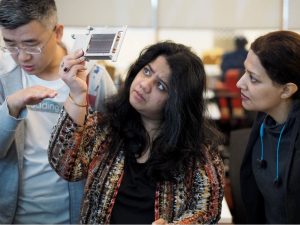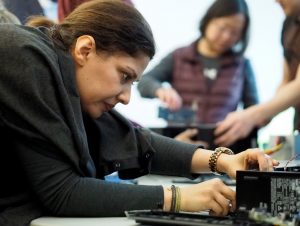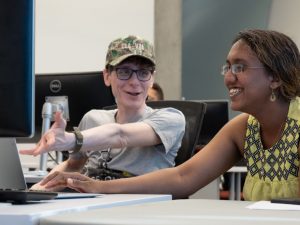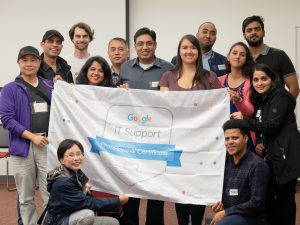Supported by a generous donation from Google.org, Surrey, Toronto, Hamilton, and Edmonton Public Libraries have partnered to enhance the reach and instruction of the Google IT Support Professional Certificate (GISC) hosted on the Coursera platform. GISC is a professional IT certificate specialization that is designed to equip learners with the skills and education required for an entry-level IT support role. Each year participating libraries will distribute a total of 250 free scholarships to GISC via Coursera.org. Learners are required to attend weekly in-person Learning Circles at each library site. In addition to the 50 scholarships at each library site, the project includes 50 scholarships for a cohort of online learners living outside the four designated cities. The cohort of remote learners are required to attend a weekly Online Office Hour via web-based video conference software. All sites follow the same GISC weekly schedule on Coursera.org. Having nearly reached the halfway mark of the project, we’re beginning to understand how the Learning Circle model could effectively increase adult learner engagement for programs in library systems across BC.
Today, there is no shortage of options for anyone looking to learn online. Several libraries in B.C. have taken great strides to improve access to massive open online courses (MOOCs). While many adults register for online learning, a recent study by academics at MIT found that online courses had an alarming dropout rate of about 96% on average over 5 years (Reich and Ruipérez-Valiente, 2019). Although online learning offers greater flexibility and access when compared to the traditional classroom, many experts are beginning to recognize “individual barriers as well as structural barriers which prevent many people from being able to take full control over their own learning experiences” (P2PU, 2019, para, 2). P2PU developed Learning Circles to be “an open, collaborative learning environment. Learning circles can create a rich learning environment in which everyone simultaneously teaches and learns, acts and observes, speaks and listens. This exposes people to new perspectives, provides an opportunity to develop useful social skills, and allows individuals to achieve something greater than they could have on their own.” You can learn more about Learning Circle facilitation by taking P2PU’s free online course at https://p2pu.github.io/facilitate-course/.
With our first cohort nearing completion, the early numbers suggest our learner completion rate will be much higher than self-led learners that have paid to access GISC on their own. In fact, all four Canadian libraries involved in this project are experiencing high levels of early completion. The only exception is the online cohort of remote learners, where the dropout rate is relatively high and early figures indicate a low completion rate. Our team has interpreted the low performance of our remote learners as evidence to support the effectiveness of in-person Learning Circles. Efforts to mimic in-person learning circles were attempted by way of weekly Online Learning Circles, however the privacy considerations and technical limitations of web-based video conferencing simply did not afford the same benefits as a face-to-face Learning Circle.
Learning Circles help adults complete self-led studies and gain the skills they want to learn. We’ve experienced early success with GISC in Canadian libraries, however I feel it’s important to highlight that a library Learning Circle program can succeed with any course subject. Toronto Public Library has delivered successful Learning Circles on a range of topics, including critical thinking, philosophy, and ESL. Canadian libraries currently offering free cardholder access to MOOCs are perfectly positioned to enhance learner engagement by facilitating Learning Circles in their buildings.
There remains a lot to unpack about Learning Circles and their place in libraries. The lessons learned from our first cohort will help us make improvements with our second cohort of 250 new learners scheduled to begin in March 2020. If you are interested in starting a Learning Circle program in your library system, feel free to contact me with your questions. To learn more about GISC, please visit https://www.coursera.org/professional-certificates/google-it-support.
References
P2PU. (2019). Activity: Anybody can learn anything. Retrieved from https://p2pu.github.io/facilitate-course/modules/outreach/activity-anybody-can-learn-anything/
Reich, J. and Ruipérez-Valiente, J. A. (2019). The MOOC Pivot. Science, 363(6423), 130-131. doi: 10.1126/science.aav7958
Erol Olcay has a background in Children’s Librarianship and is temporarily employed as the Site Lead for the Google IT Support Professional Certificate at Surrey Libraries.





